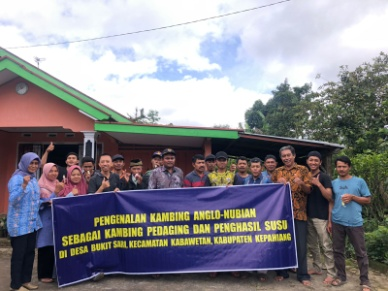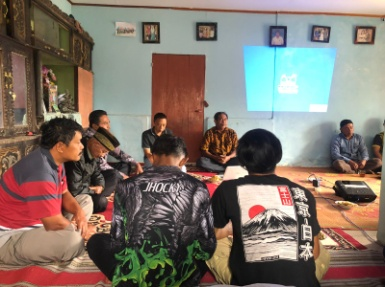
Community Service: Introduction of Anglo Nubian Goats as Meat and Milk Producing Goats in the village of Bukit Sari, District of Kabawetan, Kepahiang
Hidayat, Tris Akbarillah dan Amir Husaini Karim Amrullah
Animal Science Department, Faculty of Agriculture, The University of Bengkulu
Bukit Sari Village is one of the villages in the Kaba Wetan sub-district, Kepahiang district, bordering the villages of Tangsi Duren and Tangsi Baru, to the west, to the east by the villages of Bandung Jaya and Bandung Baru, to the south by the village of Suka Sari, and to the south. to the north it is bordered by the villages of Bukit Kaba Wetan and Bukit Menyan. Residents of the village of Bukit Sari earn a living as farmers of vegetables, coffee or both, originating from various regions such as Lampung, Rejang and Java. Like most agricultural areas, the people in Bukit Sari village also raise livestock, such as cows and goats. The community livestock business in this village is very beneficial for the welfare of the family members of the group. This causes livestock to become a family savings commodity which is needed at any time, such as the cost of entering a child’s school, by selling the livestock they own. In addition, livestock manure that is kept can be used as fertilizer on agricultural land/plantations managed by farming communities.
Raising goats mainly as savings, the results of which are obtained by selling livestock when needed. That is, the result obtained is achieved over a long time. This is because the goats kept are local types of slaughter goats (which produce meat for a long time). The limited level of knowledge about more productive types of goats encourages the need to introduce more productive goats. One type of goat is the Anglo Nubian goat, a goat from England, which is a dual-purpose type of goat, producing meat and milk, and very adaptive in tropical climates. In the last six years, the goat has been developed in the Commercial Zone of Animal Laboratory, Department of Animal Husbandry, Faculty of Animal Husbandry, UNIB, both as a pure breed and crossed with local goats. The lactating mother of the crossbreed goats is capable of producing 1.5-2 liters of milk per day, while pure breeds are able to produce 2.5-3 liters per day, while adult male goats can weigh 65-80 kg. By paying attention to this performance, Anglo Nubian goats can be used as savings (children) and provide daily yields (in the form of milk). Therefore the introduction of Anglo Nubian goats was carried out to farmers in the village of Bukit Sari, in the form of counseling and provision of prospective male Anglo Nubian goats. Farmers who raise this type of goat are expected to be able to sell their children once a year (with larger sizes) and get daily yields in the form of goat’s milk from the mothers who give birth. The goat’s milk can be consumed alone as a nutritional supplement for the family or sold as part of the family income.
An introduction to the types of dairy goats/Anglo Nubian types that have the potential to be reared was carried out in the village of Bukit Sari. This training explains about the Anglo Nubian goat, its characteristics and performance, as well as its maintenance management, such as goat feed and reproduction. After the extension activities, the discussion continued with the assessment of the maintenance of Nubian goats by farmers. The community responded well to this activity by planning to buy Anglo Nubian goats. On this occasion, the counseling participants were also introduced to products from dairy goats and tasted goat’s milk ice.
After providing knowledge about dairy/Anglo Nubian goats, the farmers were provided with 1 Anglo Nubian goat, a prospective male to later cross-breed with female goats owned by the farmer. This male Anglo Nubian goat can later be used to improve the performance quality of the milk production of his offspring. The benefits of this activity will of course increase understanding of goat farming, especially dairy/Anglo Nubian goats and their breeds, especially how to increase the productivity of goat livestock which is not only in the form of savings, but also provides daily yields.
Evaluation of activities is carried out at the end of the activity by discussing and asking questions to farmers during counseling. As a benchmark is increasing farmer knowledge by answering questions during discussions, applying the results of counseling by presenters and increasing the ability of farmers to handle feed availability, feeding based on their needs, and milking milk.
It can be concluded that breeders are very interested in Anglo Nubian dairy goats. The enthusiasm of the participants was seen by asking how to get Anglo Nubian goats and the price and asking for contact numbers for consultations. This activity can be carried out more constructively if there is institutional cooperation/communication between the Department of Animal Husbandry, Faculty of Agriculture, Bengkulu University, and the Agriculture Office of Kepahyang Regency


